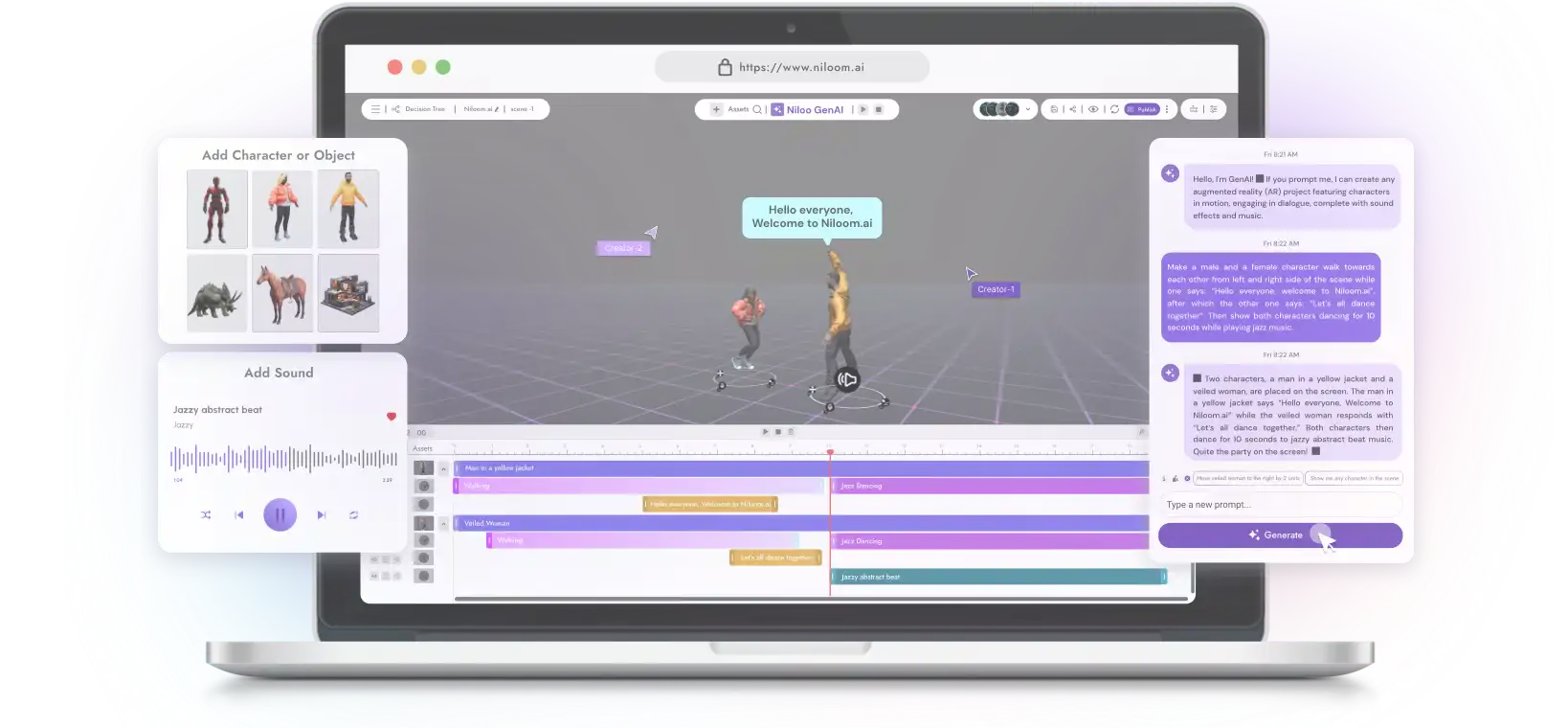Table of Contents
Spatial computing, which encompasses augmented reality (AR) and virtual reality (VR), is poised for a massive leap forward thanks to Niloom.ai’s groundbreaking generative AI platform. This revolutionary tool eliminates the technical barriers that have traditionally limited AR/VR content creation, opening the door for a new wave of immersive experiences designed by anyone, not just seasoned developers.
Unleashing Creativity with Generative AI
Niloom.ai’s intuitive interface empowers users to create sophisticated AR/VR experiences through simple text or voice prompts. The generative AI platform’s engine, GenAI, takes care of the heavy lifting, automatically generating complete AR/VR scenes, personalized AI agents, and individual assets like 3D models, animations, and sound effects. This eliminates the need for complex coding or reliance on large teams of engineers, making spatial computing content creation accessible to a wider audience than ever before.
Streamlined Workflow for Maximum Efficiency
Niloom.ai goes beyond simply generating assets. It streamlines the entire content creation process, from ideation to publishing. Users can leverage a comprehensive suite of editing tools for real-time collaboration, precision editing, version control, and testing. A visual timeline allows creators to maintain a bird’s-eye view of their entire project, facilitating the development of complex storylines and interactive elements.
Democratizing Spatial Computing for All
Before Niloom.ai, creating AR/VR content was a time-consuming and expensive endeavor. Niloom.ai breaks down these barriers, allowing creators of all technical backgrounds to bring their ideas to life in a fraction of the time and at a fraction of the cost. This empowers a new generation of storytellers, educators, and entrepreneurs to explore the vast potential of spatial computing.
Industry Leaders Hail Niloom.ai’s Potential
Niloom.ai has garnered praise from leading figures in the spatial computing industry. Ori Inbar, co-founder of the Augmented World Expo, applauds Niloom.ai for its ability to not only empower creators but also to delve deeper, crafting intricate scenes and interactions. Debu Purkayastha, a strategic advisor to Niloom.ai, emphasizes the platform’s groundbreaking nature, highlighting its potential to become a sought-after partner for major tech companies seeking to empower the next wave of content creators.
Getting Started with Niloom.ai’s Generative AI Platform

The Niloom.ai platform is now available in the U.S., offering a seamless one-stop solution for all your spatial computing content creation needs. The first 1,000 creators can secure exclusive early access, including a bonus to the Pro Version. With Niloom.ai, the future of spatial computing is no longer a distant dream – it’s a creative playground waiting to be explored.
The Future of Niloom.ai and Generative AI Platform in Spatial Computing
While Niloom.ai’s current capabilities are impressive, the future holds even greater possibilities for generative AI platforms in spatial computing. Here’s a glimpse into what we can expect:
- Enhanced Generative Capabilities: As Niloom.ai refines its GenAI engine, we can anticipate even more sophisticated content generation. Imagine AI that can not only create individual assets but also craft entire narratives with dynamic storylines and adaptive environments.
- AI-powered Collaboration: Niloom.ai could evolve to facilitate seamless collaboration between humans and AI creators. Users might interact with the platform to provide artistic direction, while AI handles the technical aspects of scene generation and refinement.
- Democratization of Monetization: Niloom.ai can empower creators not just in content creation, but also in monetization. The platform could integrate features for selling AR/VR experiences directly to users or integrating them into existing applications.
- Interoperability Across Devices: Niloom.ai’s commitment to interoperability is commendable. As the spatial computing landscape evolves, the platform’s ability to seamlessly adapt to new devices and ecosystems will be crucial for its continued success.
Challenges and Considerations
While the future of generative AI platforms in spatial computing is bright, there are challenges to address:
- Ethical Considerations: As AI becomes more sophisticated in crafting narratives, ethical concerns surrounding bias and misinformation must be addressed. Niloom.ai will need to ensure its platform promotes responsible AI development and content creation.
- Data Security and Privacy: The vast amount of data required to train generative AI models raises data security and privacy concerns. Niloom.ai will need to prioritize robust data security measures and transparent user privacy policies.
- The Role of Human Creativity: Generative AI should not replace human creativity; it should augment it. Niloom.ai should strive to empower creators by providing them with tools that unleash their artistic vision, not automate them out of the equation.